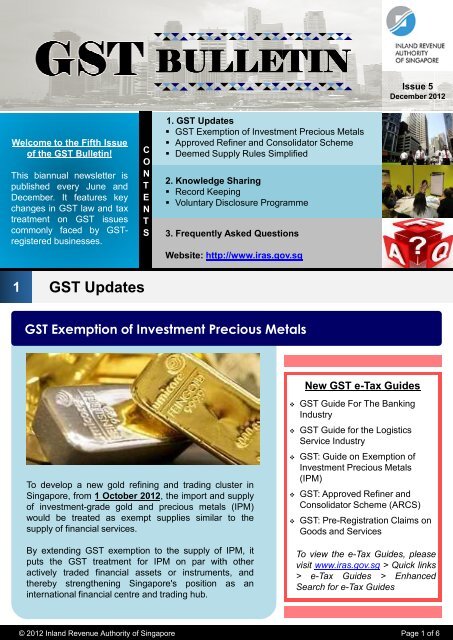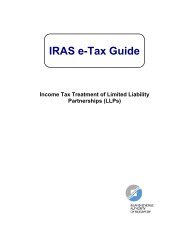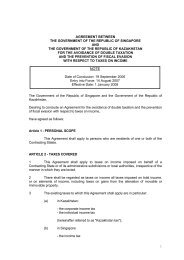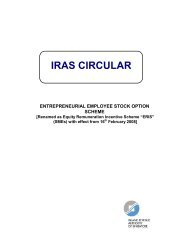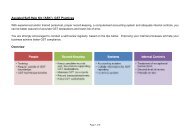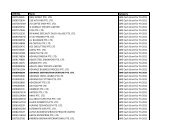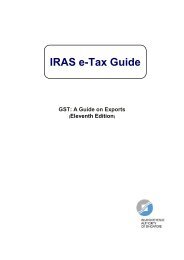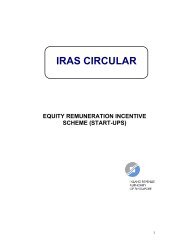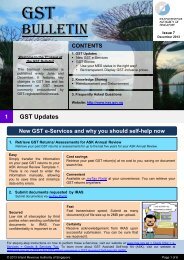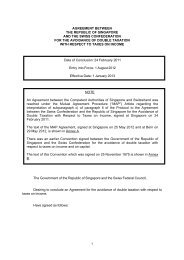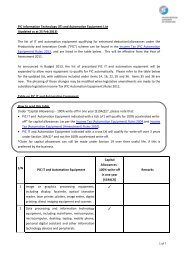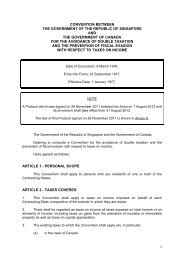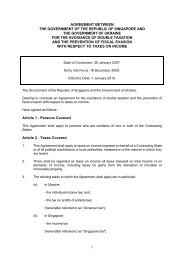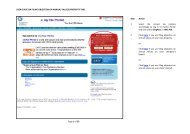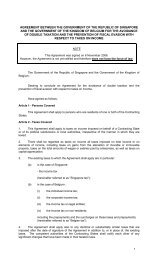Download - IRAS
Download - IRAS
Download - IRAS
Create successful ePaper yourself
Turn your PDF publications into a flip-book with our unique Google optimized e-Paper software.
BULLETIN<br />
Issue 5<br />
December 2012<br />
Welcome to the Fifth Issue<br />
of the GST Bulletin!<br />
This biannual newsletter is<br />
published every June and<br />
December. It features key<br />
changes in GST law and tax<br />
treatment on GST issues<br />
commonly faced by GSTregistered<br />
businesses.<br />
C<br />
O<br />
N<br />
T<br />
E<br />
N<br />
T<br />
S<br />
1. GST Updates<br />
GST Exemption of Investment Precious Metals<br />
Approved Refiner and Consolidator Scheme<br />
Deemed Supply Rules Simplified<br />
2. Knowledge Sharing<br />
Record Keeping<br />
Voluntary Disclosure Programme<br />
3. Frequently Asked Questions<br />
Website: http://www.iras.gov.sg<br />
1<br />
GST Updates<br />
GST Exemption of Investment Precious Metals<br />
New GST e-Tax Guides<br />
To develop a new gold refining and trading cluster in<br />
Singapore, from 1 October 2012, the import and supply<br />
of investment-grade gold and precious metals (IPM)<br />
would be treated as exempt supplies similar to the<br />
supply of financial services.<br />
<br />
<br />
<br />
<br />
<br />
GST Guide For The Banking<br />
Industry<br />
GST Guide for the Logistics<br />
Service Industry<br />
GST: Guide on Exemption of<br />
Investment Precious Metals<br />
(IPM)<br />
GST: Approved Refiner and<br />
Consolidator Scheme (ARCS)<br />
GST: Pre-Registration Claims on<br />
Goods and Services<br />
By extending GST exemption to the supply of IPM, it<br />
puts the GST treatment for IPM on par with other<br />
actively traded financial assets or instruments, and<br />
thereby strengthening Singapore's position as an<br />
international financial centre and trading hub.<br />
To view the e-Tax Guides, please<br />
visit www.iras.gov.sg > Quick links<br />
> e-Tax Guides > Enhanced<br />
Search for e-Tax Guides<br />
© 2012 Inland Revenue Authority of Singapore Page 1 of 6
1 GST Updates<br />
GST Exemption of Investment Precious<br />
Metals<br />
Definition of IPM<br />
To qualify for the exemption, the IPM (e.g. a bar, ingot,<br />
coin or wafer) must:<br />
(a) have purity content of at least<br />
99.5% for gold;<br />
99.9% for silver; or<br />
99% for platinum.<br />
(b) capable of being traded on the international bullion market:<br />
For bars, wafers or ingots, they must be produced by an accredited/endorsed refiner<br />
• For gold and silver, a refiner in the current or former “Good Delivery” list of the London Bullion<br />
Market Association (LBMA);<br />
• For platinum, a refiner in the current or former “Good Delivery” list of the London Platinum &<br />
Palladium Market (LPPM); or<br />
• A refiner who intends to be in the “Good Delivery” list of the LBMA (for gold and silver) or LPPM<br />
(for platinum) and is endorsed by the International Enterprise Singapore; and<br />
For coins, it must be prescribed in the IPM Qualifying Coin List prescribed under the Fourth<br />
Schedule to the GST Act and is or was legal tender in its country of origin.<br />
(c) bear a mark or characteristic internationally accepted as guaranteeing its quality; and<br />
(d) trade at a price based on the spot price of the metal it contains.<br />
Importation of IPM<br />
Businesses are required to take up an<br />
Exemption permit via TradeNet®.<br />
Claiming of input tax<br />
Only input tax incurred for the making of taxable<br />
supplies are claimable. As such, for input tax<br />
incurred for the making of both taxable and exempt<br />
supplies, only a portion is claimable (i.e. calculated<br />
based on the percentage of taxable supplies over<br />
total supplies).<br />
For more information on permit declaration,<br />
please refer to Singapore Customs website<br />
www.customs.gov.sg > News and Events ><br />
2012 Circulars > Circular No 12/2012<br />
For more information on exemption of IPM,<br />
please refer to our website at www.iras.gov.sg ><br />
GST: For GST-registered businesses > Charge &<br />
Claim GST: When is GST not charged: Exempt<br />
supplies > Budget 2012 – Exemption of<br />
investment gold, silver and platinum<br />
© 2012 Inland Revenue Authority of Singapore Page Page 2 of of 66
1 GST Updates<br />
A new GST scheme, the Approved Refiner and Consolidator<br />
Scheme (ARCS), was introduced to complement the GST<br />
exemption of IPM.<br />
It is designed to ease cash flow and compliance of qualifying<br />
refiners and consolidators of IPM in their payment of GST on<br />
import and purchase of raw materials, as well as to relieve input<br />
tax incurred in their refining activities.<br />
To be eligible for ARCS, the person must be a qualifying refiner or<br />
qualifying consolidator.<br />
Benefits of joining ARCS<br />
Approved Refiner:<br />
Enjoys import GST suspension.<br />
Does not need to collect and account for GST on goods supplied to another ARCS person.<br />
However, this does not include the supply of refining activities.<br />
Can claim all the input tax incurred in the course or furtherance of the business, except for<br />
expenses specifically disallowed under Regulations 26 and 27.<br />
Approved Consolidator:<br />
Enjoys import GST suspension.<br />
Does not need to collect and account for GST on goods supplied to an Approved Refiner.<br />
Can claim more input tax than it would have been entitled to under normal GST rules.<br />
• For non-bank, input tax can be claimed in full on expenses incurred for the purchase of goods for conversion into<br />
IPM and making the first sale of newly refined IPM. Residual input tax will be subject to a special apportionment<br />
formula, as set out in the e-Tax Guide.<br />
• For bank, input tax can be claimed in full on the purchase and import of precious metals. Other expenses will be<br />
subject to the fixed input tax recovery rate.<br />
Approved Refiner and Consolidator Scheme<br />
For more information, please refer to our website at www.iras.gov.sg > GST: For GST-registered businesses<br />
> GST Schemes > Approved Refiner and Consolidator Scheme (ARCS)<br />
Deemed Supply Rules Simplified<br />
When you give away goods for free, you are treated as making a<br />
supply to the recipient.<br />
Prior to<br />
1 October<br />
2012<br />
From<br />
1 October<br />
2012<br />
• A business is required to deem a<br />
supply when goods are given away<br />
for free except when:<br />
• The gift of goods is not more than<br />
$200 and it does not form a series<br />
of gifts; or<br />
• The business is not entitled to input<br />
tax claim on the purchase of goods.<br />
• A business is required to deem a<br />
supply when goods are given away<br />
for free, except when:<br />
• The gift of goods is not more than<br />
$200; or<br />
• No input tax credit has been<br />
allowed* to the business on the<br />
purchase or import of these goods.<br />
Ease GST<br />
compliance cost!<br />
Businesses are no longer<br />
required to track the<br />
number of goods given<br />
free as gifts.<br />
Businesses who do not<br />
wish to account for GST<br />
on the deemed supply of<br />
goods are given the<br />
option not to claim input<br />
tax on the gift of goods<br />
upfront.<br />
*If the GST on the supply of the<br />
goods to you has been suspended<br />
(e.g. goods imported under Major<br />
Exporter Scheme), the GST<br />
suspended is treated as input tax<br />
allowed to you.<br />
© 2012 Inland Revenue Authority of Singapore Page Page 32 of of 66
2 Knowledge Sharing<br />
Record Keeping<br />
Good record keeping practices are an important<br />
part of your business. It ensures that your tax<br />
declarations are duly supported with the required<br />
documents.<br />
In general, businesses need to keep:<br />
Income records;<br />
Purchases and business expense records;<br />
Other records to support GST declaration; and<br />
Statements and accounting schedules.<br />
For records pertaining to prescribed accounting<br />
periods ending before 1 January 2007, you are<br />
required to keep the records for seven years.<br />
For prescribed accounting periods ending on or<br />
after 1 January 2007, you are required to keep<br />
the records for five years.<br />
For more information, please refer to our website<br />
at www.iras.gov.sg > GST: For GST-registered<br />
businesses > Charge & Claim GST: Price display,<br />
invoicing and record-keeping > Keeping records<br />
<strong>IRAS</strong> has created a self-assessment tool kit to<br />
help businesses perform a self-review of their<br />
existing record keeping standards and to better<br />
understand the possible areas for improvement.<br />
To download a copy of the toolkit, please<br />
visit our website at www.iras.gov.sg > About<br />
<strong>IRAS</strong> > Taxpayer Compliance > Record keeping<br />
essentials for businesses > Record keeping selfassessment<br />
toolkit<br />
Accounting Software Assistance Scheme<br />
With effect from 1 April 2012, all businesses can<br />
apply to IDA for a grant under IDA’s iSPRINT<br />
(Packaged Solutions) scheme to defray the costs<br />
of purchasing accounting software that are listed<br />
on <strong>IRAS</strong>’ Accounting Software Register. For more<br />
information, please refer to our website at<br />
www.iras.gov.sg > Business: <strong>IRAS</strong> Accounting<br />
Software Register and IDA’s website at<br />
www.ida.gov.sg.<br />
Voluntary Disclosure Programme (VDP)<br />
We believe that the majority of taxpayers are generally<br />
compliant but occasionally, they may make mistakes in their<br />
GST tax returns due to ignorance or negligence, and without<br />
willful intent to cheat on taxes.<br />
The VDP aims to encourage this group of taxpayers to come<br />
forward voluntarily to get their GST tax matters right.<br />
For the submission of incorrect GST returns, taxpayers can<br />
be penalised for up to 200% of the tax undercharged. Under<br />
the VDP, <strong>IRAS</strong> will either waive or reduce the penalty for<br />
cases which meet the qualifying conditions.<br />
Voluntarily<br />
Compliant<br />
Unaware<br />
Negligent<br />
Errant<br />
Waived or reduced penalty!<br />
For GST F7 filed within a ‘grace period’ 0% penalty<br />
For GST F7 filed after the ‘grace period’ reduced 5% penalty on tax due<br />
• Grace period is one year from the statutory filing date<br />
© 2012 Inland Revenue Authority of Singapore Page Page 42 of of 66
2 Knowledge Sharing<br />
Voluntary Disclosure Program (VDP)<br />
How to disclose?<br />
Businesses should notify<br />
<strong>IRAS</strong> of past GST errors<br />
made by submitting a<br />
GST F7 return (Disclosure<br />
of Errors on GST Return)<br />
for the period affected.<br />
You may request for a<br />
GST F7 return (Disclosure<br />
of Errors on GST Return)<br />
from myTax Portal and e-<br />
File the GST F7 return<br />
anytime up to 14 days<br />
from the date of request.<br />
For more information, please refer to our website at www.iras.gov.sg > GST > Compliance Matters > Report<br />
a mistake to qualify for zero penalty or lower penalty<br />
GST Assisted Compliance<br />
Assurance Programme (ACAP)<br />
ACAP is an initiative by <strong>IRAS</strong> to facilitate<br />
GST-registered businesses in better<br />
managing their GST risks. To further signal<br />
<strong>IRAS</strong>' commitment to partner businesses to<br />
enhance their tax risk management and<br />
strengthen their GST internal controls, <strong>IRAS</strong><br />
will invest another $5 million from 1 April 2012<br />
to co-fund 50% of the fees incurred by GSTregistered<br />
businesses in undertaking ACAP.<br />
This is in addition to the<br />
original budget of $5<br />
million set aside by <strong>IRAS</strong><br />
when ACAP was first<br />
launched in April 2011.<br />
For more information on ACAP, please refer to our<br />
website at www.iras.gov.sg > GST > GST<br />
Initiatives to Facilitate Voluntary Compliance ><br />
ACAP<br />
Do you know<br />
You can access the following e-Services via<br />
myTax Portal.<br />
<br />
<br />
<br />
<br />
<br />
<br />
<br />
Update Contact Details & Subscribe to<br />
Alert<br />
View Return Status<br />
View Account Summary/Payments<br />
View Correspondence/Notices<br />
Apply for Declaration of Agents for selected<br />
schemes<br />
Apply for GST Registration<br />
Apply for Cancellation of GST Registration<br />
For the above list of e-Services, please visit<br />
www.iras.gov.sg > Quick links > e-Services ><br />
GST<br />
© 2012 Inland Revenue Authority of Singapore Page 5 of 6
3 Frequently Asked Questions<br />
Q1:<br />
I have filed a GST F7 to correct errors made<br />
in the past return and have made payment for<br />
the GST amount under-accounted or overclaimed<br />
after that. Why do I need to pay a 5%<br />
late payment penalty?<br />
<strong>IRAS</strong>:<br />
GST due is payable within one month from the<br />
end of the prescribed accounting period. If the<br />
GST F7 is submitted after one month from the<br />
prescribed accounting period and it resulted in<br />
additional tax due, it means that the tax is<br />
already overdue. Therefore, late payment<br />
penalty is imposed on the additional tax.<br />
Q2:<br />
I omitted to include one supplier’s tax invoice<br />
(taxable purchase $2,000 + input tax $140) in<br />
my Q2 GST F5 and one customer’s tax<br />
invoice (standard-rated supply $10,000 +<br />
output tax $700) in my Q3 GST F5. The total<br />
value of supplies declared in my Q2 GST F5<br />
is $123,000 and in my Q3 GST F5 is<br />
$155,000. Must I file a GST F7?<br />
<strong>IRAS</strong>:<br />
You should file GST F7 to correct errors made in<br />
GST returns. As a concession, you may adjust<br />
for the errors made earlier in your next GST F5 if<br />
you meet both of the following criteria:<br />
• The net GST amount in error for all the<br />
affected prescribed accounting periods is not<br />
more than $1,500.<br />
• The summation of non-GST amounts in error<br />
for (each of) the affected accounting periods is<br />
not more than 5% of the total value of supplies<br />
declared in the submitted GST return (i.e. Box<br />
4).<br />
Although the net GST amount in error of $560<br />
(i.e. $700 – $140) for all affected accounting<br />
periods is not more than $1,500, the non-GST<br />
amount in error for Q3 is more than 5% ($10,000<br />
/ $155,000) of the total value of supplies, you are<br />
required to submit a GST F7 for Q3 to correct the<br />
Q3 errors. For the errors made in Q2, you may<br />
adjust the errors in your next GST F5 as both<br />
criteria for the concession can be met.<br />
Disclaimer<br />
The contents of this bulletin are provided on an “as is” basis without<br />
warranties of any kind. <strong>IRAS</strong> shall not be liable for any damages,<br />
expenses, costs or loss of any kind however caused as a result of, or<br />
in connection with your use of this bulletin. The information provided<br />
here is to give a better understanding of taxpayer's GST obligations.<br />
As the information may be subject to change, taxpayers may wish to<br />
refer to the <strong>IRAS</strong> website at www.iras.gov.sg for the latest updates. In<br />
any event, while every effort is made to ensure that the contents<br />
herein are consistent with existing law and practice, members of the<br />
public are advised to refer to the relevant legislation to be certain of<br />
their legal and tax obligations.<br />
Q3:<br />
Can I preserve my records in other forms<br />
(e.g. in electronic format)?<br />
<strong>IRAS</strong>:<br />
You may preserve your records in other forms<br />
if you comply with the guidelines set in the e-<br />
Tax Guides “Keeping of records in Imaging<br />
Systems” and “Keeping machine-sensible<br />
Records and Electronic Invoicing”. You are not<br />
required to seek approval from the Comptroller<br />
of GST. For a copy of the e-Tax Guides,<br />
please visit our website www.iras.gov.sg ><br />
Quick links > e-Tax Guides > Enhanced<br />
Search for e-Tax Guides.<br />
Q4:<br />
What if I lose some of my records before I<br />
submit GST F5 return?<br />
<strong>IRAS</strong>:<br />
If you are unable to maintain sufficient<br />
documents to support your input tax claim, you<br />
should not claim input tax.<br />
If you are unable to maintain supporting<br />
documents to prove the export of your goods<br />
or provision of international services, you will<br />
have to treat your sale as a local supply and<br />
account for the GST accordingly.<br />
Penalties may be imposed for failure to<br />
maintain sufficient documents to support your<br />
GST declaration.<br />
Tax Academy of Singapore organises GST courses<br />
for professionals/ businesses who wish to attain basic/<br />
in-depth knowledge of GST.<br />
Upcoming GST Courses organised by Tax Academy:<br />
• Executive Tax Programme Level I (GST) –<br />
February 2013<br />
• Executive Tax Programme Level II (GST) –<br />
February 2013<br />
Subsidies are available for eligible participants:<br />
• 50% <strong>IRAS</strong> Subsidy – For all SME Tax Agents and<br />
In-house Tax Professionals<br />
• 15% ICPAS Subsidy – For ICPAS members<br />
For more information, please visit<br />
www.taxacademy.sg.<br />
© 2012 Inland Revenue Authority of Singapore Page 6 of 6


